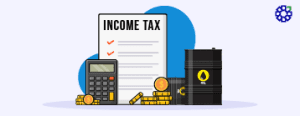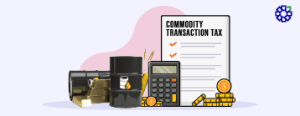Commodity Market
- 22nd August 2025
- 8 min read
Do you want to trade in commodities like gold, silver, and crude oil just like stocks? The commodity market can help you execute such trades.
The Indian commodity market is anticipated to increase by 1.28% per year, reaching a total estimated value of USD 1.72 trillion by 2030. Hence, beginners need to understand the commodity market meaning to take advantage of this growth.
This blog provides a beginner’s guide on what is commodity market by highlighting its types, advantages, and disadvantages.
What is a Commodity Market?
A commodity market is a market where investors can trade commodities such as energy, natural gas, spices, crude oil, and precious metals. Commodities offer an alternative to traditional investing opportunities for investors wanting to diversify their portfolios. This helps them hedge against inflation and lowers risk.
For instance, 22 commodity exchanges in India have been set up by the Forward Markets Commission. Some of the popular commodity exchanges in India are:
- Indian Commodity Exchange (ICEX)
- Multi-Commodity Exchange of India (MCX)
- National Commodity and Derivative Exchange (NCDEX)
- National Multi-Commodity Exchange of India (NMCE)
What are the Different Types of Commodities?
Since you have understood the commodity market definition or meaning, let us move forward to the different types of commodities that can be traded:
Hard Commodities
- Gold
- Platinum
- Copper
- Silver
- Crude oil
- Natural gas
- Gasoline
Energy, construction, and technology are just a few of the industries that depend on hard commodities. However, natural disasters and geopolitical crises might cause their price movements to be extremely volatile.
Soft Commodities
- Wheat
- Soybeans
- Corn
- Salt
- Rice
- Coffee
- Pork
- Live cattle
- Feeder cattle
These soft commodities play a significant role in the global food supply chain. Seasonal changes and shifts in supply may affect their price.
How Does the Commodity Market Work?
The spot market and the derivatives market are the two primary platforms where the commodities market operates. Commodities are exchanged with real-time delivery on the spot market. Spot market refers to an instant exchange of the commodity at the going rate.
Commodity futures and options contracts are traded in the commodities derivatives market. These agreements require traders to set a price for a good that will be delivered on a given future date. Commodity derivatives markets can be used for speculation, investments, and commodity hedging.
Now, let us understand the trading process with an example. Suppose you purchased a gold futures contract on the MCX for INR 90,000 per 10 grams. On MCX, gold has a 3% margin. So, you will be paying INR 2700 for your gold. Let us evaluate your profitability in 2 different scenarios:
- If the price of gold rises to INR 91,000 per 10 grams the next day. The bank account you have connected to the commodity market will get a credit of INR 1,000.
- If it falls to INR 90,500 the next day. As a result, INR 500 will be taken out of your bank account.
Significance of Investing in the Commodities Market
There are multiple purposes for investing in the commodity market. Some of them are:
- Positions in commodities like gold, which act as a hedge against inflation and other geopolitical risks, may be taken through the commodities market.
- Investing in commodities enables portfolio diversification.
- During times of recession or geopolitical unpredictability, investing in particular commodities may provide dividends.
How to Trade Commodities in India?
Just like stocks, you can easily trade commodities in the commodities market by following the pointers below:
- Open a trading account with a reputable broker on an exchange that has been licensed by the government, such as MCX in India.
- Identify commodities that provide consistent returns according to your financial objectives and risk tolerance.
- Start trading commodities when you start trading futures contracts. Until they become familiar with the market, this enables them to reduce risks and safeguard their funds.
- When it comes to commodities, ensure consistency and discipline for better trading or investing decisions.
- Follow market developments and trends to make wise trading choices and take measured risks.
You can open a trading account with PL Capital Group – Prabhudas Lilladher with zero annual maintenance fees and start trading in the commodities market. PL offers robust tools and trading strategies to improve your trading experience.
How are Commodity Exchange Prices Determined?
These are the factors that determine commodity exchange prices:
-
Demand and Supply
The supply and demand for goods influence the prices of commodities. An increase in demand can also increase the price of commodities. This is frequently caused by a negative market outlook that drives investors to safer investment options.
-
External Factors
Price changes may also result from any situation that affects the overall production of the goods exchanged in an exchange. For instance, an increase in manufacturing costs may result in higher market pricing for a product, which may impact the equilibrium rate of the commodity.
-
Global Situation
Domestic commodity prices can be impacted by international events. For example, crude oil prices can be impacted by any turmoil in Middle Eastern countries, which can have an effect on both local and export trade.
-
Speculation
Speculative investors who want to profit from changes in market prices may create demand for online derivative investing in commodities. In order to earn capital gains on total profits, speculators frequently predict the direction of price movement and try to close the contract before the expiration date.
-
Market Outlook
Due to the low possibility of significant price movements for some commodities, investors may turn to commodity trading in response to any unanticipated changes in the stock market.
Advantages of Trading Commodities
-
Higher Returns
In order to profit from the price volatility of commodities, speculators engage in commodities. Depending on their market prediction, they might take a long or short position.
-
Portfolio Diversification
Individuals can lessen their exposure to the risks associated with traditional asset classes like stocks and bonds by including commodities in their portfolio.
-
Hedge Against Inflation
Investors can benefit from an increase in the real value of their corpus investment. The prices of commodities typically rise over time more quickly than a country’s rising inflation rate.
-
Improves Price Predictability
Investors can predict future price swings due to the commodities market. They can learn about the expectations and mood of the market by trading commodity futures contracts.
-
Margin Trading
Brokers provide a lower trading margin for commodity trading. It allows trading on borrowed money for both hedgers and speculators to benefit from the transaction.
However, if you trade commodities with PL Capital, you can enjoy all of these benefits with features like a margin trading calculator.
Disadvantages of Trading Commodities
-
Risk of Leverage
Compared to equities, trading commodities online sometimes requires more leverage. However, traders may be tempted to make excessive transactions as a result of this increased leverage.
-
Extreme Volatility
Compared to equities and bonds, commodities are often more volatile. The notable price swings may divert investors’ attention and affect their trading plans.
-
Influence of Geopolitical Factors
The commodity market is vulnerable to geopolitical factors throughout the world. If crude oil output rises, oil prices may fall, and vice versa.
Final Thought
To trade in the commodity market, understanding what is commodity market is crucial. Commodity pricing is influenced by various factors, so understanding and learning effective trading strategies is crucial. Despite offering more leverage, it also carries a higher risk due to frequent market changes. It is important to seek professional advice if you are new to commodity trading.
Download the PL DigiTrade application and log in to invest in the commodity market. The PL DigiTrade provides valuable features like an advanced option chain, a margin calculator, and more.
Frequently Asked Questions
1. Who oversees India’s commodity market?
The Securities and Exchange Board of India (SEBI) oversees the Indian commodity market. It is under the domain of the Ministry of Finance within the Government of India.
2. What function does the commodity market serve?
The commodity market serves as a platform where individuals engage in the purchasing and selling of basic goods or raw materials. Investors can trade in commodities like natural gas, spices, crude oil, and precious metals in the market.
3. What does the commodity market term ‘hedger’ actually mean?
A hedger in the commodity market is a person or business that purchases or sells the physical commodity.
4. Which are the top five commodities in India?
There are a lot of commodities that can provide substantial returns. Five of them are gold, silver, crude oil, natural gas, and wheat.





